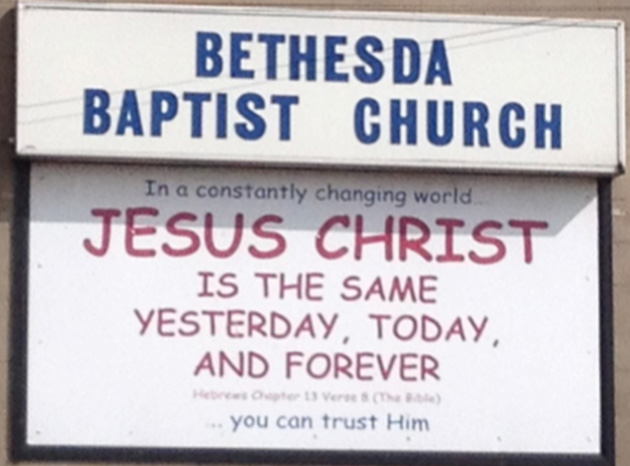04 May 2015
A Text and its Context
by Dr Philip Church
Hebrews 13:8 seems to be oddly placed. The chapter begins with a series of ethical injunctions. Some of these have reasons for the injunctions, e.g. they are to show hospitality to strangers, since there is a chance that they might entertain some angels; they are to honour marriage, for God will judge adulterers; and they are to refrain from the love of money because God will never forsake them.
Some of these have reasons for the injunctions, e.g. they are to show hospitality to strangers, since there is a chance that they might entertain some angels; they are to honour marriage, for God will judge adulterers; and they are to refrain from the love of money because God will never forsake them.
These ethical injunctions are followed by an injunction to remember their former leaders, those who brought the word of God to them (see Heb 2:1-4), and after v. 8 which I will return to in a moment, they are encouraged to avoid all kinds of strange teaching.
Verse 8 seems to fit awkwardly into this sequence. Strangely also for Greek, which likes to run sentences together with a variety of conjunctions, this one starts abruptly:
Jesus Christ is the same yesterday and today and forever.
The Greek word order is even more awkward. There is no verb (as is common in Greek):
Jesus Christ, yesterday and today the same, and forever.
Some commentators, noting its abrupt placement, suggest that it is unrelated to its surroundings. However, others, rightly in my opinion, note the logic involved. They are to remember their former leaders who brought them the word of God and to consider the outcome of their way of life (perhaps martyrdom), and imitate their faith (v. 7), and they are to avoid strange teaching (v. 9). In this writer’s mind, absolutely central to the word of God that had been brought to them, was the good news of the coming of Christ and the forgiveness that was achieved by the sacrifice of himself. I don’t have time to go into it now, but the strange teachings that they were to avoid were probably connected with ritual meals at the synagogue, with some relationship to the Jerusalem temple (I get this from vv. 9-12, which some people have described as the most difficult in all the New Testament). With the coming of Jesus who was the reality to which the temple pointed, these were now alien to the gospel.
The unchanging one, Jesus Christ, whom the former leaders had introduced to them in the recent past (yesterday) was the same today, and would remain the same into the future. If they hold firmly to him they will not be carried away by teachings alien to the gospel. This seems to me the reason for the placement of v. 8 here.
I saw this verse on a notice board outside a church recently when visiting Exeter in England. I wonder if the good people of the Bethesda Baptist Church also noted the abrupt way the verse appears in Hebrews, and felt that it needed some explanation. On their notice board it has become part of a longer sentence. “In a constantly changing world Jesus Christ is the same yesterday, today and forever … you can trust him.”

But is it valid for them to take this text from its context and place it in an entirely new context. If, on their Notice Board, it implied something about teaching alien to the gospel, it could be read as a warning to avoid the church, or perhaps avoid other churches in the neighbourhood in favour of Bethesda Baptist. But that seems not to be the point. What the verse has become for them is a message of good news to be broadcast to the people of Ipswich about Jesus, who remains stable and unchanging in the face of “the change and decay that all around they see.”
I wonder if you have noticed what I have just done. The words in quote marks at the end of my last paragraph come from the hymn “Abide with me,” by Henry Francis Lyte (1793-1847). I have taken his words out of their context and placed them in the new context of this blog, just as the people of Bethesda Baptist church did with Heb 13:8.
It used to be said that “a text without a context is a pretext.” But now I am not so sure. We all frequently quote others and allude to the things they say. The technical term for this is “intertextuality.” It is a fruitful field in biblical studies, especially where the NT writers quote or allude to verses from the OT. But what happens when they do that is give the earlier text a new context in their own writing. And I am not sure that this needs to stop with the NT. It seems to me that the Bethesda Baptist Church notice board is a perfectly valid use of the text from Hebrews. And if someone was to read it and ultimately come to faith, there would be rejoicing among the angels of heaven.
